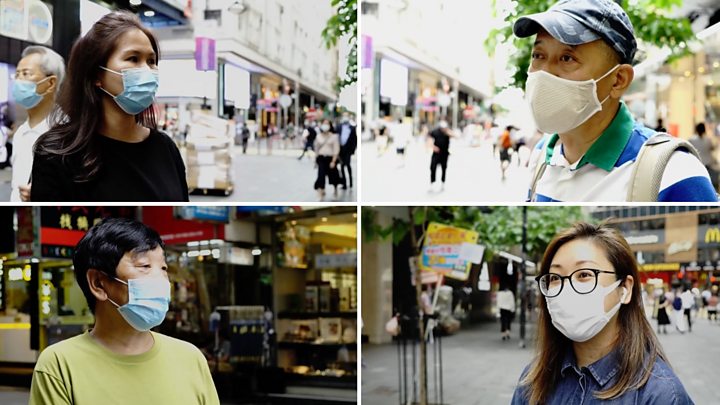Hong Kong security law: Carrie Lam dismisses concerns over rights
 Image copyright Getty Images
Image copyright Getty ImagesHong Kong's leader Carrie Lam has said other countries "have no place" interfering in the territory, as she robustly defended a controversial national security law planned by China.
The law would ban treason, secession, sedition and subversion. Critics say it would limit the city's freedoms.
But in her first public comments, Ms Lam said it was a "responsible" move to protect the law-abiding majority.
She denied that the law would curtail the rights of Hong Kongers.
These rights - set out in the Basic Law which is Hong Kong's mini-constitution - have been in place since it was handed back to China in 1997 by the UK. It guarantees freedoms to the territory, such as the right to protest, which do not exist on the mainland.
At the weekend, there was a brief return to the protests seen last year, with police firing tear gas as thousands of people took to the streets.
What is happening with the law?
It is not actually a law yet, but a proposal - which is being called a "draft decision" - that will be put to a vote at China's rubber stamp parliament, the National People's Congress (NPC), this week.
That vote should take place by Thursday and then the proposal will be fleshed out into a draft law.
Ever since it was announced it has faced fierce criticism internationally, but in her weekly press conference, Ms Lam said other countries had "no place in interfering with this arrangement".
No country would tolerate having a flawed national security legislation, she said, and Hong Kong, as part of China, was no different.

Opponents of the security law in Hong Kong say it is a direct attempt to curtail the city's freedoms.
How did she address concerns?
Ms Lam repeatedly said that there is no detail yet, but that the text of China's resolution should reassure the public.
She also spoke of the "positive response" from the public in the past few days, saying it "flies in the face of what those overseas politicians are saying".
The bill would target "a handful of people" involved in terrorism or subversion, she said, and anyone worried about it should wait for the full details to be released by Beijing.
Hong Kong's freedoms, vibrancy and core values "will continue to be there", she said, but added: "Rights and freedoms are not absolute."
The law would enhance Hong Kong's status as a global financial centre, rather than damage it, she said, calling those fears "totally groundless".
There is also concern that the law could allow China to install its own law enforcement agencies in Hong Kong, alongside the city's own.
Ms Lam said fears that this could lead to people being arrested retroactively for taking part in protests were "imagination".
What is the background?
Hong Kong saw months of increasingly violent protests last year, sparked by a bill which would have allowed criminal suspects to be extradited to mainland China.
The bill was eventually dropped but by that stage the protests had escalated to include wider calls for greater independence for Hong Kong.
Although those protests died away, in part after pro-independence groups made significant gains in local elections, anti-mainland sentiment remains high in the territory.
Features
Elsewhere on the BBC
Lyrics quiz
Have you been getting these songs wrong?
Full article Lyrics quizFeeling hot
What happens to your body in extreme heat?
Full article Feeling hotfrom BBC News - Home https://www.bbc.co.uk/news/world-asia-china-52803500
via PakapNews